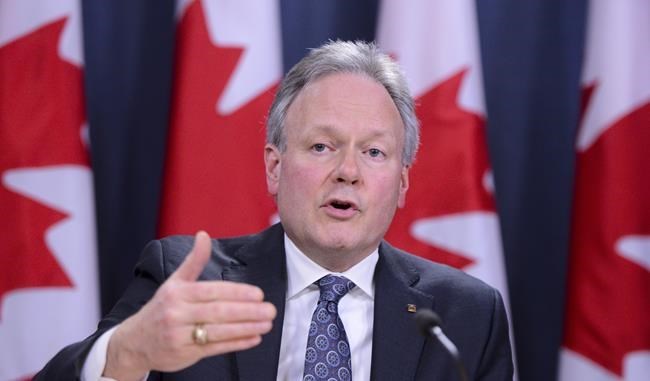OTTAWA — Canada's top central banker says adding an income-support measure like the Canada Emergency Response Benefit to the government's tool kit could help the country more quickly respond to sudden shifts in the economy.
More than 8.1 million people have applied for the $2,000-a-month benefit since it became available in early April, with payments now totalling over $38.4 billion — rising beyond its $35-billion budget.
It has replaced employment insurance through the COVID-19 pandemic, and spurred calls for the federal government to create a basic income program.
The idea of a basic income means different things to different people, but is at its core a no-strings-attached payment governments provide instead of a variety of targeted benefits.
Bank of Canada governor Stephen Poloz, who did not explicitly back a basic income program, said something like the CERB would help in the future because the central bank will likely have less room to manoeuvre on its monetary policy when the next shock rolls around.
Speaking to reporters by videoconference Thursday, Poloz said there is growing consensus that stronger, automatic support programs would be a beneficial investment.
He added it would be a long-range project, but would eliminate the need to pass special legislation or quickly devise new programs.
"The CERB, the way it's been created, now that we've seen how that works, that works a lot faster than EI," Poloz said.
"Adding that tool to the fiscal tool kit is the sort of thing that can make the fiscal delivery more automatically sensitive to the economic cycle."
After the COVID-19 pandemic struck Canada in mid-March, the bank quickly slashed its key interest rate to 0.25 per cent, bringing it as low as Poloz has said it will go. A report Thursday from TD Economics suggested the Bank of Canada won't starting increasing the policy rate until at least 2022.
Poloz said Thursday we are in an era of low interest rates due to "demographic reasons and economic growth reasons," although he did not know how low.
The central bank did not have a "pandemic playbook" to guide decision-making, Poloz said, but it did have an idea of what it would do if the country faced a significant, and sharp, economic downturn.
The bank's actions over the last two months — the rapid drop in rates and expansion of bond purchases to help governments finance programs — closely mirrored the plan, he said.
Ever since, the central bank has been working at what Poloz described as a frenetic pace.
That pace ends June 2 when Poloz steps down, turning the reins of the institution over to Tiff Macklem, whose official return to the bank on June 3 will come with a rate announcement — although expectations are that nothing will change.
The two have spent a lot of time together as part of a similar transition Poloz went through seven years ago when he replaced Mark Carney, who had Macklem as his second-in-command at the time.
Looking back over his term, Poloz noted a change in how the central bank sets its key interest rate, which can influence rates charged on consumer loans and mortgages.
He said central banks now pay attention to the real economy, trying to mitigate risks while keeping long-term inflation on track. That has made the bank more relevant to the average Canadian, he said, even if that connection isn't obvious.
"Folks would look at the Bank of Canada and say, 'I guess they took care of stuff because not much seemed to happen,' in terms of how credit works and how markets worked," Poloz said.
"That's what I mean when I say the better you do it, the less relevant it seems because there's not really a problem to fix. Like the plumbing in your house: If it works great, that's the last you hear about it. But, boy, the weekend it doesn't, then you've got something going on."
He said policy-makers will have to be patient with a coming economic rebound, hoped for in the second half of the year, and what he sees as a surge in company creation.
He said some economic forecasts and predictions are "a little too dire."
"It's a little overblown. It's natural, of course. It's best to be prepared for the worst and be positively surprised," he said.
"I'm relatively optimistic compared to what the talk is."
This report by The Canadian Press was first published May 21, 2020.
Jordan Press, The Canadian Press



